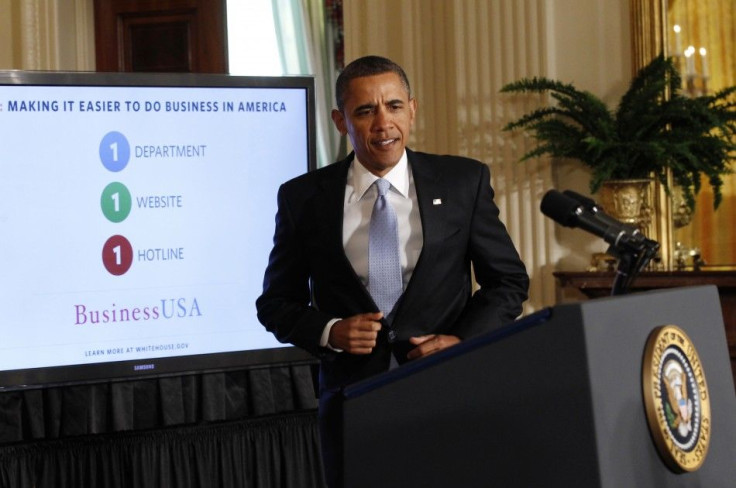U.S. President Obama Focuses on Exports in Proposed Revamping of Government

President Barack Obama asked Congress on Friday for broad powers to overhaul the U.S. government and untangle what he called an outdated bureaucratic maze that makes it hard for U.S. businesses to sell their goods abroad.
Obama said he wanted to consolidate six trade and business agencies into a single export body to help the United States better compete in a 21st-century economy and modernize a government he said had grown too complex.
The move could help inoculate him against charges from Republicans hoping to unseat him in November that he is a feckless liberal who has presided over one of the largest expansions of the U.S. government in history.
Ronald Reagan, an idol of conservative Republicans, was the last U.S. president who had the authority to reorganize the government in a similar fashion. But Obama must contend with some Democrats who worry that merging the agencies will backfire and some Republicans who are unwilling to give the president wider powers. Analysts were skeptical that Congress would approve Obama's request in an election year.
The consolidation of power Obama is seeking would allow him to design structural changes to the government that lawmakers would have to approve or reject, without revisions.
Obama said he wanted to move the Office of the U.S. Trade Representative (USTR) and five other export bodies spread across Washington into a new trade department, giving businesses a single point of contact and trying to ensure that Washington's export promotion packs a punch.
The National Oceanic and Atmospheric Administration (NOAA) -- now part of the Commerce Department -- would be absorbed by the Department of the Interior under the plan, and the Census Bureau as well as other statistical agencies would find a home in the new, yet-to-be-named department. The Commerce Department would then be closed.
A representative of Mitt Romney, the front-runner in the Republican presidential nomination race who has said he would make it a top priority to cut the scale of government, cast Obama's proposals as campaign spin.
It's ironic that President Obama, who has grown government beyond belief for the past three years, is calling for consolidation of government. It is unfortunate that he is only doing so now to curry political favor in an election year, Andrea Saul said.
Export Promotion
In a speech delivered at the White House, Obama said the overhaul would make it easier for U.S. businesses to work with the government and boost their overseas sales, essential to his economic goal of doubling U.S. exports by 2015.
He also announced he would elevate the Small Business Administration to a Cabinet-level post -- his inner circle of senior officials -- with immediate effect to underscore his focus on smaller companies as an engine of job growth and recovery.
Nick Consonery, a China analyst at the Eurasia Group in Washington, said there was a genuine need for the United States to strengthen its trade policy as it seeks to increase exports and also ensure other economies play by the rules.
We are definitely entering an environment where they will take trade disputes more aggressively, and this would help provide a streamlined structure for that, he said.
Lawmakers Unconvinced
On Capitol Hill, several key lawmakers expressed concern about the plan to anchor the specialized USTR -- which negotiates free-trade deals and monitors for rule-breaking -- in a broader bureaucracy where its work may get bogged down.
Taking USTR, one of the most efficient agencies that is a model of how government can and should work, and making it just another corner of a new bureaucratic behemoth would hurt American exports and hinder American job creation, U.S. Sen. Max Baucus, D-Mont., and U.S. Rep. Dave Camp, R-Mich., who chair committees overseeing trade policy, said in a joint statement.
U.S. Rep. Sander Levin of Michigan, the senior Democrat on the House of Representatives Ways and Means Committee, which oversees USTR, noted Congress established that agency because our trade objectives were not adequately negotiated, implemented, or emphasized when trade negotiators and enforcers were part of a broader agency.
The lawmakers' comments raised questions about the White House's strategy for selling Obama's plan on Capitol Hill. But even if Congress rejects it, it would still be a win for the president, who has made running against an obstructionist Congress a central theme of his re-election campaign.
John Murphy of the U.S. Chamber of Commerce also stressed it was important to avoid hurting the USTR with a merger. The business community would oppose its merger with the Commerce Department, whose functions are quite different, he said.
Seeking to illustrate how complex government bureaucracy had become, Obama showed a slide at the White House with a bubble diagram that showed a dizzying array of Web sites, toll-free numbers, and customer-service centers that were available to small-business owners seeking advice on loans and how to export.
It's a mess, Obama said, after noting his favorite example of the bureaucratic maze. As it turns out, the Interior Department is in charge of salmon in fresh water, but the Commerce Department handles them in saltwater, he said.
A White House official said the goal was to save $3 billion over 10 years from streamlining the trade agencies, which may lead to the loss of 1,000 to 2,000 jobs through attrition.
(Additional reporting by Doug Palmer, Richard Cowan, Stella Dawson, Susan Heavey, David Lawder, Steve Holland, Glenn Somerville, and Matt Spetalnick; Editing by Ross Colvin and Stacey Joyce)
© Copyright Thomson Reuters 2024. All rights reserved.












